Please fill out the following information, and RRFC Admissions will contact you to discuss our program offerings:
Issue #184
by L. Swift and Jeff McQ
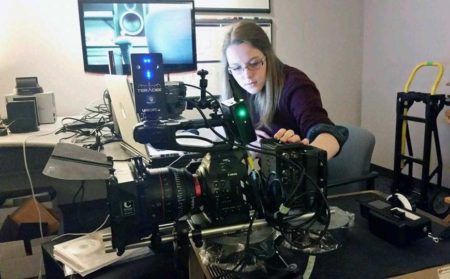 From the time Rachel Svatos (Dallas, TX) decided she wanted a career in film, she knew she didn’t want to go the conventional educational route.
“I was looking for something that wasn’t the typical four-year college,” she says. “You don’t get to touch any equipment until you’re a senior thing.” I found [Film Connection] online and was like, ‘This sounds cool, and it might be better than trying to go through the typical college film programs where you have to take biology along with everything else.’ I found that kind of pointless because, for the most part, as long as you have experience in the field, I feel like you don’t need a degree for a lot of things. So I felt like getting a degree like that would be kind of a waste of time and money when I could be working, because if I were in college right now I wouldn’t get to work on the films that I get to work on because I’d have class.”
The decision paid off big-time. Since enrolling in the Film Connection with mentor Jason Van Sickle in Dallas, TX at age 16, Rachel (now 19) has been part of nearly 40 projects by her count, including 6 feature films! In fact, she says she wound up in a key position in her first feature film no less than a month after she started, and it immediately changed her point of view.
From the time Rachel Svatos (Dallas, TX) decided she wanted a career in film, she knew she didn’t want to go the conventional educational route.
“I was looking for something that wasn’t the typical four-year college,” she says. “You don’t get to touch any equipment until you’re a senior thing.” I found [Film Connection] online and was like, ‘This sounds cool, and it might be better than trying to go through the typical college film programs where you have to take biology along with everything else.’ I found that kind of pointless because, for the most part, as long as you have experience in the field, I feel like you don’t need a degree for a lot of things. So I felt like getting a degree like that would be kind of a waste of time and money when I could be working, because if I were in college right now I wouldn’t get to work on the films that I get to work on because I’d have class.”
The decision paid off big-time. Since enrolling in the Film Connection with mentor Jason Van Sickle in Dallas, TX at age 16, Rachel (now 19) has been part of nearly 40 projects by her count, including 6 feature films! In fact, she says she wound up in a key position in her first feature film no less than a month after she started, and it immediately changed her point of view.
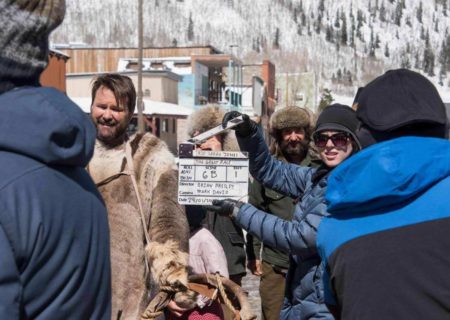 “About a month after I started I got on my first feature film,” she says. “That was fantastic. It was with my mentor and I learned so much, and I somehow ended up assistant directing the film because we didn’t have an assistant director…I used to go train at a studio that was for acting and for behind the camera stuff, and one of the tech directors was going through all of the different roles in film, explaining what each one of them does, and said, ‘The assistant director, well, they’re just the bitch on set,’ and moved on from that. I was like, ‘I never want to be an assistant director. That sounds miserable.’ Then through my first experience on a feature film set with the Film Connection, I figured out that, no, it is something I like to do, and they’re not just the ‘bitch on set.’ It’s much more exciting and fulfilling than was ever made out to me…I really enjoy it and find it fulfilling, and it’s something that I feel like I’m good at.”
Since that time, Rachel says the opportunities have just continued coming, largely due to the connections she has made and the experience she’s gaining. “Every project has kind of led to another project, more or less, and through different people every time,” says Rachel. “Recently I was just in Colorado camera assisting for a shoot that I got on through a friend that I met on another shoot. It just all kind of links together.”
A recent project of Rachel’s is a timely short film called Don’t Forget Us, a short film commenting on the recent election from the children’s point of view. The concept, Rachel says, came from an 11-year-old child actress named Morgan Gullett, with whom Rachel had worked on a prior project.
“She came up with this idea that she wanted to make a short film about the election recently, and how it affects the children and stuff of today,” Rachel explains. “I had wanted to do something sort of like that, but I just hadn’t gone through the trouble of making it yet. So she contacted me and asked me if I wanted to help her direct it. So we went through preproduction, found a screenwriter, and casted several children, and she wants to be a casting director when she grows up, basically. So she did the whole casting process by herself. We shot the project in Dallas over the winter, right before January, when the inauguration was.”
Don’t Forget Us has gone on to the film festival circuit, winning the Best of the Best Film Competition in Los Angeles recently, and set to screen later this month at the San Diego International Kids Film Festival. Contrary to the presuppositions of other filmmakers, Rachel says it’s a pleasure to work with kids like Morgan.
“I feel like children are so creative and they want to be creative at such a young age,” says Rachel, “and that not letting them have the experience of being a real creative individual and always just calling them a kid and pretending like it’s kid acting, kid theater, all that stuff, it just kind of undermines their creative ability. So I feel like it’s not a problem to work with kids. You have to be patient with them, but I feel like you also have to be patient with adults, and adults can be worse sometimes because they’ll have attitudes and get bratty for their own reasons, just like kids will sometimes…So giving them the chance to really do something and really express what they want to do as actors I think is a fantastic thing.”
Now at age 19 and with so many projects under her belt, Rachel shows no signs of stopping. To her, it’s already a career, and she thrives on the high level of commitment it requires.
“There’s no way to get around the 12-hour day,” she says. “You kind of have to just love it so much that you’re cool with that, because it’s a lot of work, they’re long days, super long nights or full night shoots. I feel like you have to be flexible in not doing the same thing every single day. The 9-5 grind isn’t really what it is, ever…You have to be completely committed, I feel like, because there are the people who do the weekend projects and they have a normal job and day life. But I feel like that’s no way to have a real job doing film. You have to expect it to be your job.”
“About a month after I started I got on my first feature film,” she says. “That was fantastic. It was with my mentor and I learned so much, and I somehow ended up assistant directing the film because we didn’t have an assistant director…I used to go train at a studio that was for acting and for behind the camera stuff, and one of the tech directors was going through all of the different roles in film, explaining what each one of them does, and said, ‘The assistant director, well, they’re just the bitch on set,’ and moved on from that. I was like, ‘I never want to be an assistant director. That sounds miserable.’ Then through my first experience on a feature film set with the Film Connection, I figured out that, no, it is something I like to do, and they’re not just the ‘bitch on set.’ It’s much more exciting and fulfilling than was ever made out to me…I really enjoy it and find it fulfilling, and it’s something that I feel like I’m good at.”
Since that time, Rachel says the opportunities have just continued coming, largely due to the connections she has made and the experience she’s gaining. “Every project has kind of led to another project, more or less, and through different people every time,” says Rachel. “Recently I was just in Colorado camera assisting for a shoot that I got on through a friend that I met on another shoot. It just all kind of links together.”
A recent project of Rachel’s is a timely short film called Don’t Forget Us, a short film commenting on the recent election from the children’s point of view. The concept, Rachel says, came from an 11-year-old child actress named Morgan Gullett, with whom Rachel had worked on a prior project.
“She came up with this idea that she wanted to make a short film about the election recently, and how it affects the children and stuff of today,” Rachel explains. “I had wanted to do something sort of like that, but I just hadn’t gone through the trouble of making it yet. So she contacted me and asked me if I wanted to help her direct it. So we went through preproduction, found a screenwriter, and casted several children, and she wants to be a casting director when she grows up, basically. So she did the whole casting process by herself. We shot the project in Dallas over the winter, right before January, when the inauguration was.”
Don’t Forget Us has gone on to the film festival circuit, winning the Best of the Best Film Competition in Los Angeles recently, and set to screen later this month at the San Diego International Kids Film Festival. Contrary to the presuppositions of other filmmakers, Rachel says it’s a pleasure to work with kids like Morgan.
“I feel like children are so creative and they want to be creative at such a young age,” says Rachel, “and that not letting them have the experience of being a real creative individual and always just calling them a kid and pretending like it’s kid acting, kid theater, all that stuff, it just kind of undermines their creative ability. So I feel like it’s not a problem to work with kids. You have to be patient with them, but I feel like you also have to be patient with adults, and adults can be worse sometimes because they’ll have attitudes and get bratty for their own reasons, just like kids will sometimes…So giving them the chance to really do something and really express what they want to do as actors I think is a fantastic thing.”
Now at age 19 and with so many projects under her belt, Rachel shows no signs of stopping. To her, it’s already a career, and she thrives on the high level of commitment it requires.
“There’s no way to get around the 12-hour day,” she says. “You kind of have to just love it so much that you’re cool with that, because it’s a lot of work, they’re long days, super long nights or full night shoots. I feel like you have to be flexible in not doing the same thing every single day. The 9-5 grind isn’t really what it is, ever…You have to be completely committed, I feel like, because there are the people who do the weekend projects and they have a normal job and day life. But I feel like that’s no way to have a real job doing film. You have to expect it to be your job.”
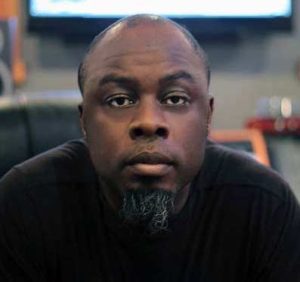 With more than 20 years of experience and hundreds of recording projects to his credit, Recording Connection mentor Ira Parker is a solid industry veteran to say the least. As founder of Maximus Music Records in Charlotte, NC, Ira works with a wide range of clients, and in the process he goes the extra mile to make sure his students get a full range of experience. Not just satisfied to teach the fundamentals, Ira also is passionate about helping students learn how to convey themselves professionally and to network in order to get clients. In the following interview, Ira offers some key advice on that topic, shares his secrets on staying inspired—and even brags on a few of his students along the way! Enjoy!
With more than 20 years of experience and hundreds of recording projects to his credit, Recording Connection mentor Ira Parker is a solid industry veteran to say the least. As founder of Maximus Music Records in Charlotte, NC, Ira works with a wide range of clients, and in the process he goes the extra mile to make sure his students get a full range of experience. Not just satisfied to teach the fundamentals, Ira also is passionate about helping students learn how to convey themselves professionally and to network in order to get clients. In the following interview, Ira offers some key advice on that topic, shares his secrets on staying inspired—and even brags on a few of his students along the way! Enjoy!
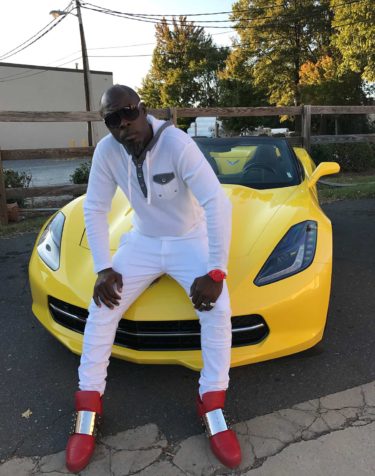 RRFC: How do you stay inspired? It seems like for creatives who work professionally, we have to measure our own level of interest and inspiration and know how to keep that well full.
Ira: Right…The thing is how do you keep the flair and fire going? I do weird things…[For example,] if I want an adrenaline rush and I need it on a track, I’ll [rent] a Corvette Stingray, dual exhaust turbo, like something dumb, and I will drive that thing for the weekend and just keep revving the engine, and it gives me ideas. It’s just the feeling in the drive, the rush, it makes me feel that adrenaline, and I’ll take my ideas on my phone and I go to the studio and I put that record down. I’ll start the beat and then I’ll go somewhere.
RRFC: Can you tell us about some of your students and recent grads that have stood out to you?
Ira: Absolutely. Wes Hagy—cool dude. Totally cool guy. Really great. The clients loved him here…The cool thing about Wes, Wes did the program here in North Carolina…We even hired him for a couple small jobs, and he got so inspired he moved to the West Coast. He moved to LA and he’s starting up his own studio out that way and doing production… Julia [Putintsev] is very outgoing…I think it’s super awesome that females get involved in the industry, and I don’t think there should be any type of waiver because she’s a female. I think females are just as great as dudes, and everybody has a great opportunity. I don’t see it any other way, and what she was dealing with at the time was her friends were kind of doubting her because she wanted to do music, and, “Girls don’t do stuff like that,” and I’m like, “Dude, are you serious? Yes they do.” And she was telling them the same thing. So what did she do? She got herself a new set of friends like I told her, and she came in here with her heart, her mind, and her soul like, “I’m going to do this, I’m going to be one of the baddest females ever to step into this business.”… Daniel Katan, which actually I’ve really taken a liking to, and I’m literally training him on my own…I’ve taken him under my wing along with doing the master’s program and training him also in studio management and everything, because he has a background as a financial advisor before he even got into this, and he’s really a good people person, and I need that type of spirit…Chris Hancock is every day going, “When can I come in? When can I come in?” I’ll get questions at all times of the day, all times of the night. I’m really busy but I love the fact that he’s eager to throw questions out, and he always listens particularly a bit closer than everybody else…I’m fond of all of them…Some of them stick out more than others by the questions they ask, the stuff I don’t think they’re picking up, and they pick up on it and drill me on it later…that type of eagerness is exciting because I know you’re learning. I know that the program for the Recording Connection works. I think it’s a wonderful program.
RRFC: How do you stay inspired? It seems like for creatives who work professionally, we have to measure our own level of interest and inspiration and know how to keep that well full.
Ira: Right…The thing is how do you keep the flair and fire going? I do weird things…[For example,] if I want an adrenaline rush and I need it on a track, I’ll [rent] a Corvette Stingray, dual exhaust turbo, like something dumb, and I will drive that thing for the weekend and just keep revving the engine, and it gives me ideas. It’s just the feeling in the drive, the rush, it makes me feel that adrenaline, and I’ll take my ideas on my phone and I go to the studio and I put that record down. I’ll start the beat and then I’ll go somewhere.
RRFC: Can you tell us about some of your students and recent grads that have stood out to you?
Ira: Absolutely. Wes Hagy—cool dude. Totally cool guy. Really great. The clients loved him here…The cool thing about Wes, Wes did the program here in North Carolina…We even hired him for a couple small jobs, and he got so inspired he moved to the West Coast. He moved to LA and he’s starting up his own studio out that way and doing production… Julia [Putintsev] is very outgoing…I think it’s super awesome that females get involved in the industry, and I don’t think there should be any type of waiver because she’s a female. I think females are just as great as dudes, and everybody has a great opportunity. I don’t see it any other way, and what she was dealing with at the time was her friends were kind of doubting her because she wanted to do music, and, “Girls don’t do stuff like that,” and I’m like, “Dude, are you serious? Yes they do.” And she was telling them the same thing. So what did she do? She got herself a new set of friends like I told her, and she came in here with her heart, her mind, and her soul like, “I’m going to do this, I’m going to be one of the baddest females ever to step into this business.”… Daniel Katan, which actually I’ve really taken a liking to, and I’m literally training him on my own…I’ve taken him under my wing along with doing the master’s program and training him also in studio management and everything, because he has a background as a financial advisor before he even got into this, and he’s really a good people person, and I need that type of spirit…Chris Hancock is every day going, “When can I come in? When can I come in?” I’ll get questions at all times of the day, all times of the night. I’m really busy but I love the fact that he’s eager to throw questions out, and he always listens particularly a bit closer than everybody else…I’m fond of all of them…Some of them stick out more than others by the questions they ask, the stuff I don’t think they’re picking up, and they pick up on it and drill me on it later…that type of eagerness is exciting because I know you’re learning. I know that the program for the Recording Connection works. I think it’s a wonderful program.
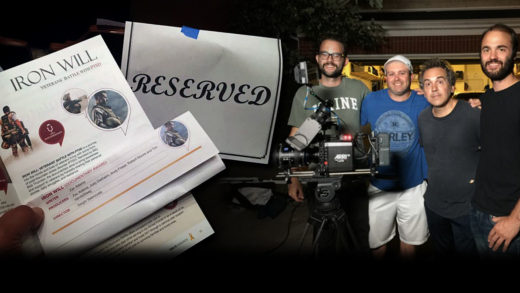
(right) On the set of Sweet Tooth, FC apprentice Corey Pitts, Zac Adams, Mark Alan Peters, Mike Stryker
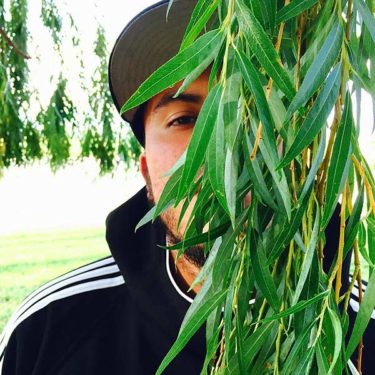 Music business student Ernesto Trujillo (Denver, CO) is learning just how vital a role the music publicist plays in an artist’s success. He says, “I learned this week about the Publicity Department and everything a publicist is capable of doing in order to make their artist stand out…They’re in charge of securing media coverage for the artists on the label…creat[ing] an attractive biography for press outlets, social media platforms and website. A publicist makes sure that the artist’s image is represented properly [and to] raise awareness of artists via the press, which then aligned with a strong marketing & promo campaign, can help sell units. I am using these strategies when investing into my music and learning about this will only help me improve the way I distribute my music.”
Music business student Ernesto Trujillo (Denver, CO) is learning just how vital a role the music publicist plays in an artist’s success. He says, “I learned this week about the Publicity Department and everything a publicist is capable of doing in order to make their artist stand out…They’re in charge of securing media coverage for the artists on the label…creat[ing] an attractive biography for press outlets, social media platforms and website. A publicist makes sure that the artist’s image is represented properly [and to] raise awareness of artists via the press, which then aligned with a strong marketing & promo campaign, can help sell units. I am using these strategies when investing into my music and learning about this will only help me improve the way I distribute my music.”

RRFC is education upgraded for the 21st century.
Get the latest career advice, insider production tips, and more!
Please fill out the following information, and RRFC Admissions will contact you to discuss our program offerings:
Stay in the Loop: Subscribe for RRFC news & updates!
© 2025 Recording Radio Film Connection & CASA Schools. All Rights Reserved.


